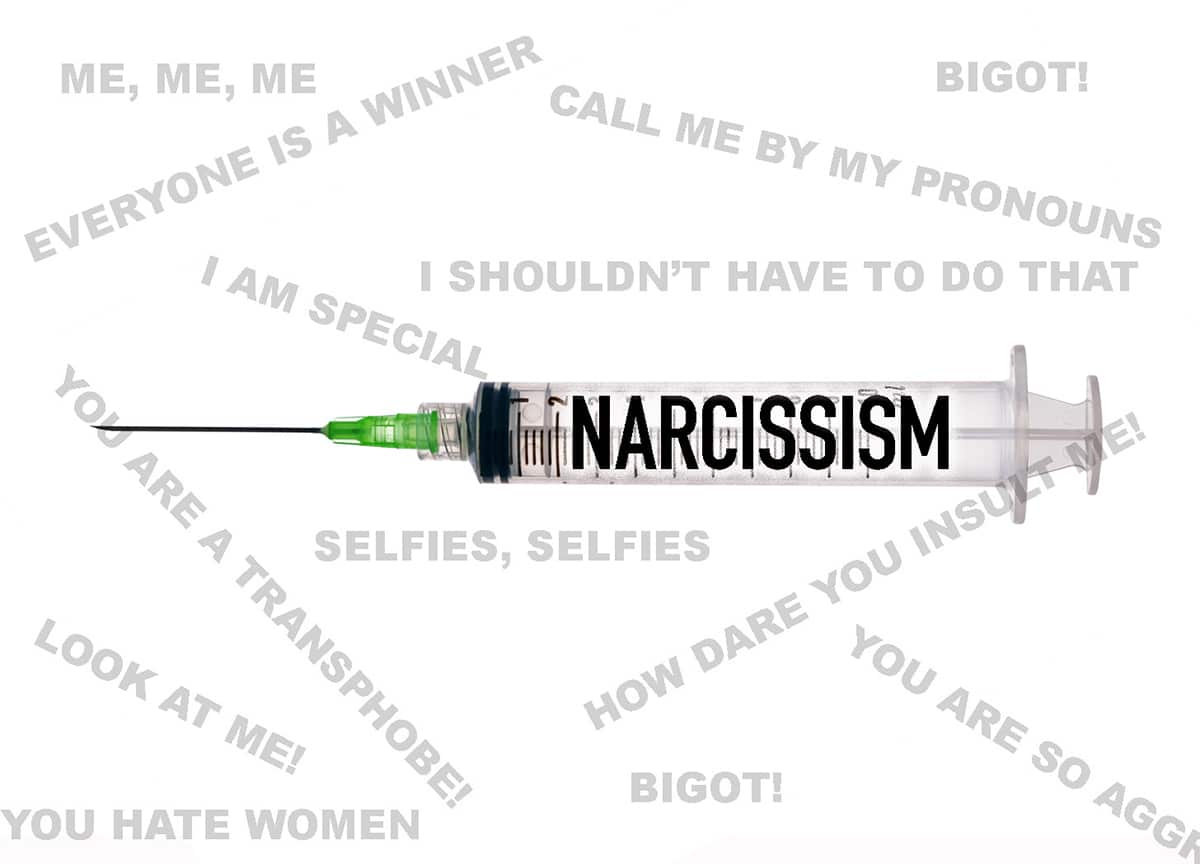

Narcissism And Agreeableness Behind Left-Wing Authoritarianism
We must be kinder and more altruistic, progressives say. The contemporary Left lionizes empathy above all virtues as the basis for a just and equitable society.
But behind these pleas for selflessness can lie darker motivations of narcissism and authoritarianism, a growing body of psychological research suggests. A Swiss study published in Current Psychology earlier this year found antagonistic narcissism and psychopathic tendencies to be strong predictors of left-wing anti-hierarchical aggression. Individuals displaying these traits are drawn to social justice causes, researchers posit, not through the pull of altruism but to satisfy their own ego-focused, even antisocial needs.
Historically, most scholarly attention has focused on Right-Wing Authoritarianism. But a growing body of literature, especially in the past decade or so, is exploring how psychological traits correlate with political ideology – including expressions of authoritarianism on both sides of the political spectrum, where they overlap, and how they differ.
Previous research found that Left Wing Authoritarianism (LWA) powerfully predicts behavioral aggression and participation in political violence. Others found a strong correlation between Dark Triad Traits (Machiavellianism, Narcissism, Psychopathy) and virtuous victim signaling, or conspicuously projecting victimhood as a moral value, which researchers say individuals use as a means of non-reciprocal resource extraction.
The research does not suggest all progressives are narcissists nor that conservatives never are. Most psychologists will likely tell you narcissism knows no bounds, political or otherwise. A 2018 study published in the American Journal of Political Science found people on the left and right to be equally narcissistic but with varying expressions, e.g., conservatives’ penchant for feelings of entitlement and superiority when it comes to issues like immigration, and liberal tendencies toward exhibitionism in the case of climate activism.
Entitlement and self-importance, the need to be great and be recognized for it, whether expressed in the tirades of a grandiose narcissist or the quieter machinations of a vulnerable narcissist, form a core of narcissism. But as the authors of the 2018 study point out, narcissism is “not simply a hyper-concern with one’s self; it is a distinct construct that groups an interrelated set of dispositions containing views of the self and others, cognitive styles, and motivations that guide behaviors, and it is a normal part of one’s identity.”
Increasingly, research showing how specific personality traits at the individual level correlate with behavior in political movements and at the macrosocial level can help us understand some of the chaos of the tumultuous times through which we’re living.
Given the current dominance of progressive liberalism, ostensibly driven by compassion, empathy, and the pursuit of social justice, researchers have taken an interest in how bad actors can infiltrate and leverage altruistic movements for nefarious ends – and where, in more subtle ways, well-intentioned activism can veer into authoritarianism.
Some progressives are genuinely altruistic in non-narcissistic ways. However, the major role that narcissism plays in today’s progressive movements is well-documented and interrogates the self-perception among many on the Left that they simply care more than conservatives.
If you, like me, are from the Left and consider yourself a highly empathetic person who values compassion, the events of the past several years and the current state of progressive politics can seem nonsensical – even absurdist. Compassion can’t begin to account for the precipitous rise of authoritarianism on the Left. So what’s going on?
Narcissism, Not Compassion

Climate protesters hold a demonstration as they throw cans of tomato soup at Vincent van Gogh’s “Sunflowers” at the National Gallery in London, United Kingdom on October 14, 2022. (Photo by Just Stop Oil / Handout/Anadolu Agency via Getty Images)
To understand this phenomenon, I sat down with Christine Brophy, a Canadian psychologist whose seminal research on political correctness in 2015 anticipated much of the interest in left-wing authoritarianism we’ve seen in the last several years.
Brophy set out to understand the personality of political correctness, what we now call “wokeness,” and to test if the concept itself held up to scrutiny if it could reliably be measured.
Her research found that PC exists and has two major dimensions: “PC -Liberalism” and “PC-Authoritarianism,” best predicted by the personality trait “Agreeableness.” The core of both pieces was compassion and a kind of general sensitivity to offense or to the social sphere. A central desire for egalitarianism, meanwhile, was used toward different ends: on the liberalism side, in pursuit of greater diversity; on the authoritarian side, to increase a sense of personal stability.
Brophy found both Right-Wing Authoritarianism (RWA) and Left Wing Authoritarianism (LWA) overlap on a dimension related to censorship and authoritarian submission – “the appeal to an external authority, a desire for rules that the authority be listened to, and that any dissenting sort of views are dangerous, that they must be censored… because the population is naïve and they cannot be trusted.”
In our current political landscape, examples of this exact behavior abound – from the COVID regime to the rise of the Censorship Industrial Complex.
But where does it come from? According to Brophy, a lack of trust, and disgust sensitivity, are strongly related. On both ends of the political spectrum, a cognitive rigidity, and an inability to tolerate nuance, informs authoritarianism.
“Basically, it’s that you recognize that the population is capable of sin,” Brophy says. “And because of that sort of lack of trust in the world, you require an external set of rules and appeal to authority in order to ensure that we don’t devolve into a state where it’s just strength battling against strength.”
How RWA and LWA differ comes down to compassion: The former will identify more with strength and the top of a hierarchy, the latter with vulnerability. But this is not just a desire to protect the vulnerable; it is also a sensitivity to the ways in which that vulnerability is demonstrated in a social environment.
“So in contrast to strength, in contrast to competition that highlights your own vulnerability, and they are hyper-aware of that… It leads [progressives] to this kind of protectiveness and identification with vulnerability,” Brophy says. “And then, on top of that, their compassion likely makes it so that they are more inclusive. They won’t just outright sort of want to kill off everything that’s unlike them, but instead, they’ll say, ‘Oh yeah, sure, come in, but you must be 100% like us.’” In other words, LWAs tend to favor assimilation over rejection.
But it all raises the question of why. Why do researchers find that narcissism correlates with authoritarianism on the Left?
As it turns out, compassion has a dark side.
Compassion evolved, Brophy explains, from the mother-child pair bond, as a caring emotion that helps motivate altruistic behavior and self-sacrifice. And it is specifically attuned to cues or stimuli of vulnerability, expressions of sadness or fear, but also narrative elements. This creates a response bias toward negative emotions.
“There is something about compassion that makes you not only attend to these stimuli more deeply and pay attention to them but then to also identify with groups that are portraying those types of characteristics,” Brophy said, adding that it also makes you more likely to aggress against individuals that compete with the group you’ve prioritized, creating an in-group, out-group dynamic.
At its pathological extreme, compassion leads to overly trusting behavior and an inability to differentiate right from wrong.
“The direct impact of compassion is that it causes the prioritization of facts, the constant understanding of cues of vulnerability where you’re not going to approach them from a position of skepticism, you’re not going to question where it’s coming from, you’re not going to attribute any agency to the individual who is displaying that vulnerability.”
As Brophy writes, “the vulnerable are given a permanent moral high ground, while those in power are the target of maternal, protective aggression – a behavior that occurs even in the absence of provocation and injustice.”
The problem arises, often at a moment of crisis, when these personality traits believe they are inherently correct and become stuck.
“It’s the way in which we turn ourselves into the people that we hate,” Brophy told me. “The moment you cross that line where it started off as compassion… that’s what created your desire to help. And it was that rewarding sense of being a person who can help people.”
But as we see in the ritualized performance of “compassion,” so often untethered from material reality, there is a point at which it becomes more about a person’s fragile sense of self and the social context of the performance.
“It’s no longer coming from a spot of genuine understanding or a genuine sort of creativity that’s inspired by the environment,” Brophy says. “Instead, you’re habitually relying on these actions, but they’ve now been transposed toward something else, which is your own personal sense of superiority.”
This altruistic form of narcissism may look different from the more familiar aggressive type, but the core is still entitlement, the belief you are great, deserving of greatness, and of recognition for it. Where this often veers into bullying and vindictive behavior, Brophy notes, is when people don’t receive the recognition they feel they deserve – either for their virtue or for their pain – and punish others for it.
“The fact that you can’t recognize my pain and that you aren’t prioritizing that, well, there’s something very evil about you.”
Implications For Progressives

Pro-drug protester in San Francisco (Thomas Hawk)
This is all very troubling for those of us who have considered ourselves part of the Left.
At the same time, Brophy’s work helps us to make sense of the impetus and behavioral factors behind a progressive movement that punishes dissent, celebrates and instantiates victimhood, and infantilizes people in the name of compassion.
Progressive-led cities are crumbling under the weight of failed policies, like those around street homelessness and illicit drugs. Cocooning people in the rhetoric of compassion while enabling their tortured demise – and profiting off of it – is cruelty.
It’s also a twisted mutation of progressive values that makes the Left unrecognizable to many who value compassion but have begun to instinctively sense the limits and damage of this pathological iteration.
Perhaps more disturbing still is the fact that a mass movement of individuals so caught in this cognitive rigidity, so wedded to their sense of identity and driven by altruistic narcissism, pave an easy road for more sinister elements.
While individuals within these movements believe they are fighting evil — “because that’s what happens when you really get attached to your personality, you get this sense of justice that you’re fighting the good fight” — Brophy says, it provides a perfect opening for a psychopath to leverage those feelings toward their own ends.
“A psychopath will come in and be like, ‘Oh, okay, this is a very fast way for me to be able to exert control, to climb a hierarchy, to tell other people to do what I want, to gain status.’”
For those with more malicious Dark Triad traits, it can also offer an opportunity to punish people, either as retribution for perceived harm or just for the pleasure they feel in the expression and experience of power.
Growing research on the psychology of Left Wing Authoritarianism offers a powerful lens for understanding and challenging the censorship and tyranny we’ve increasingly seen from the Left.
It is well past time to recognize that narcissistic behavior can drive political movements on all sides of the spectrum. Understanding the psychopathologies of left-wing authoritarianism is one of the best tools we have to recognize and resist the tyranny of today’s ruling elites.
But tomorrow’s tyranny may come from elsewhere, and we should be ready for that, too. Understanding how compassion can be perverted and hijacked does not make us less compassionate. In fact, being able to recognize when compassion has been twisted into a hollow parody of itself may help us rescue and resuscitate the Leftist values we still rightly cling to.
At the end of our discussion, the study Brophy references when she discusses the need to account for vulnerable narcissism in future research is this one, which we also reference at the top of the story. Additionally, she recommends this article, which explains vulnerable narcissism, and how it differentiates from the traditional form of narcissism that’s often measured in studies.





0 Comments